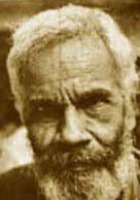Nagarjun
Nagarjun Biography
Nagarjun (Hindi:नागार्जुन, Baba Nagarjun, Vaidya Nath Mishra, Yatri) was a major Hindi and Maithili poet who has also penned a number of novels, short stories, literary biographies and travelogues, and was known as Janakavi- the People's Poet. Early Life and Education Born Vaidya Nath Mishra, in 1911, into a Maithil Brahmin family in a small village of Satlakha in Madhubani District of Bihar, India, which was his mother's village, though his family belonged to Tarauni village in Darbhanga district, Bihar. He later converted to Buddhism and got the name Nagarjun. His mother died when he was only three, and his father being a vagabond himself, couldn't support him so young Vaidya Nath thrived on the support of his relatives, and the scholarships he won on the account of him being an exceptional student. Soon he became proficient in Sanskrit, Pali and Prakrit languages, which he first learnt locally and later at Varanasi and Calcutta, where he was also semi-employed, while pursuing his studies. Meanwhile he married Aparajita Devi and the couple had six children. Career He started his literary career with Maithili poems by the pen-name of Yatri (यात्री) in early 1930s. By mid 1930s, he started writing poetry in Hindi. His first permanent job of a full time teacher, took him to Saharanpur (Uttar Pradesh), though he didn't stay there for long as his urge to delve deeper into Buddhist scriptures, took him to the Buddhist monastery at Kelaniya, Sri Lanka, where in 1935, he became a Buddhist monk, as needed to enter the monastery and study the scriptures, just as his mentor, Rahul Sankrityayan had done earlier, and hence took upon the name "Nagarjun". While at the monastery, he also studied Leninism and Marxism ideologies, before returning to India in 1938 to join 'Summer School of Politics' organized by noted peasant leader, Swami Sahajanand Saraswati, founder of Kisan Sabha. A wanderer by nature, Nagarjun spent a considerable amount of his time in the 30s and the 40s traveling across India. He also participated in many mass-awakening movements before and after independence. Between 1939 and 1942, He was jailed by the British courts for leading a farmer's agitation in Bihar. For a long time after independence he was involved with journalism. He played an active role in Jaya Prakash Narayan's movement prior to the emergency period (1975–1977), and therefore was jailed for eleven months, during the emergency period. He was strongly influenced by Leninist-Marxist ideology. This was one of the reasons that he never found patronage from the mainstream political establishments. He died in 1998 at the age of 87 in Darbhanga. Style and Influence The subjects of his poetry are varied. Effects of both his wandering tendencies and activism, is evident in his middle and later works. His famous poems like Badal ko Ghirate Dekha hai (बादल को घिरते देखा है), is a travelogue in its own right. He often wrote on contemporary social and political issues. His famous poem Mantra Kavita (मंत्र कविता), is widely considered the most accurate reflection of a whole generation's mindset in India. Another such poem is Aao Rani Ham Dhoenge Palaki (आओ रानी हम ढोएंगे पालकी), which sarcastically humiliates the then prime minister of India, Pt. Nehru, for the extravagant welcome thrown by him for Queen Elizabeth. Besides these accepted subjects of poetry, Nagarjun found poetic beauty in unconventional subjects. One of his most astonishing works is a poem based on a female pig (मादा सूअर) called paine daanto wali (पैने दाँतो वाली). Another such creation is a series of poems on a full-grown jack fruit (कटहल). Because of the breadth of his poetry, Nagarjun is considered the only Hindi poet, after Tulsidas, to have an audience ranging from the rural sections of society to the elite. He effectively freed poetry from the bounds of elitism. Languages Maithili was his mother tongue and he authored many poems, essays and novels in Maithili. He was educated in Sanskrit, Pali, and Hindi. Hindi remained the language of the bulk of his literature. The Hindi of his works varies from highly sanskritized to vernacular forms. He was a poet of the masses, and preferred to write in the language of immediate local impact. Therefore he never adhered to specific bounds of languages. He also had good grasp of the Bengali language and used to write for Bengali newspapers. He was close to the Bengali Hungry generation or Bhookhi Peerhi poets and helped Kanchan Kumari in translating Malay Roy Choudhury's long poem JAKHAM in Hindi. Awards Nagarjun was given the Sahitya Akademi Award in 1969 for his historic book Patarheen Nagna Gachh, and the 'Bharat Bharati Award' by the Uttar Pradesh government for his literary contributions in 1983. He was also honored by the Sahitya Akademi Fellowship, India's highest literary award for lifetime achievement, in 1994.)
